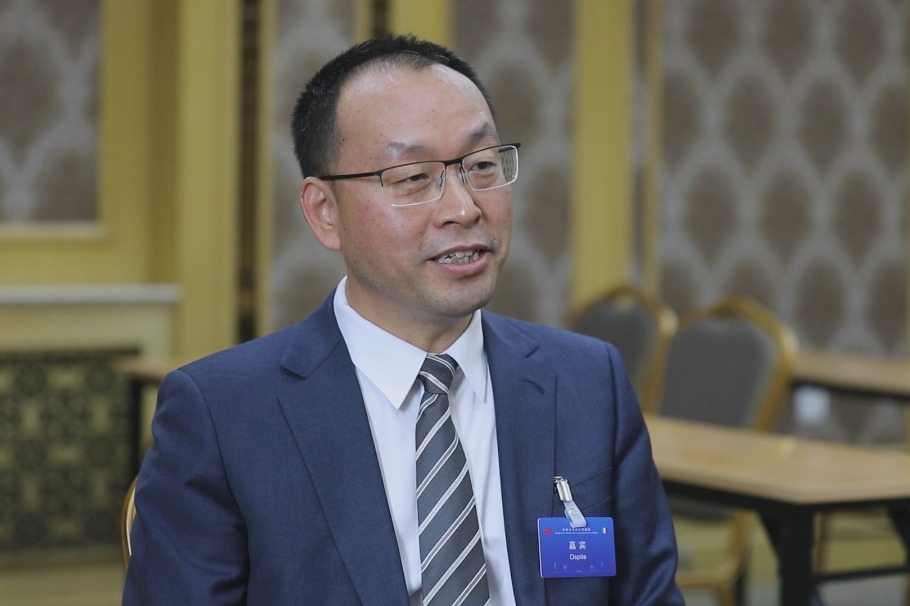Scientific researcher driven by passion for discovery


Chen Lingling is a prolific scientist who works on non-coding RNA, a field in which she is considered a leading expert on the world stage.
After studying biology and pharmacology in Lanzhou, Gansu province, and Shanghai, Chen did her PhD work at the University of Connecticut Health Center in the United States, where she developed an interest in the function of non-coding RNAs.
Ribonucleic acid, or RNA, is a nucleic acid present in all living cells that has structural similarities to DNA. A non-coding RNA is a functional RNA molecule that is transcribed from DNA but not translated into proteins.
Chen returned to Shanghai in 2011 and became one of the first scientists in China dedicated to the research of non-coding RNAs. Today, the 44-year-old scientist, who was elected as a delegate to the upcoming 20th National Congress of the Communist Party of China, is associate director of the State Key Laboratory of Molecular Biology at the Chinese Academy of Sciences' Shanghai Institute of Biochemistry and Cell Biology.
Over the past decade, Chen's lab has made many discoveries related to non-coding RNAs, which account for 98 percent of the transcript sequences in the genome — the complete set of genes or genetic material present in a cell or organism — yet remain little known. Therefore, they are described as the "dark matter" of the micro-universe of life.
For her contributions to the field, Chen has been given numerous honors and awards, including the Howard Hughes Medical Institute International Research Scholar in 2017 and the CAS' Young Investigator Award in 2018.
However, Chen wasn't always sure that research was what she wanted to do. In 2007, when she was halfway through her doctoral studies in biomedicine, she also signed up for a master's degree in business administration.
Chen said that those days of studying for two degrees kept her "crazily fulfilled" and instilled in her a "can-do" attitude. She ultimately chose scientific research over business administration because she was much more intrigued by the human genome.
"The world of RNAs is really interesting. They look the same, like a long chain that can encode genetic information called messenger RNAs (mRNAs), and some others look just like mRNAs but do not encode proteins, thereby acting as non-coding RNAs," Chen said. Her enthusiasm for non-coding RNAs is obvious, as her eyes light up at the very mention of them.
Over the past decade, Chen and her team have discovered new and unusual classes of RNA molecules called long non-coding RNAs, or lncRNAs. Chen's job now is primarily geared toward figuring out how these molecules form, what role they play in gene regulation, and how they may influence disease. She has found that some of these RNAs are conspicuously absent in people with the neurodevelopmental genetic disorder Prader-Willi syndrome.
It is known that Prader-Willi syndrome, a rare genetic defect, is caused by the deletion of a chromosome from the father, "but we don't know what the function of the missing gene segment is," Chen said. "We have learned that this segment is lacking some unusually processed lncRNAs."
Although research on the function of long non-coding RNAs, especially their disease-related function, is still in the early stages, Chen is looking forward to possible new treatments for diseases in the future.
"More and more studies have shown that changes in lncRNA expression levels are closely related to a variety of diseases, including neurological diseases, cardiovascular diseases and cancer," she said.
Over the past decade, Chen has witnessed the vigorous development in the field of long noncoding RNAs and has led her team on a path of rapid development. She described the process as one that is similar to building a business, as it also involves cultivating talent and scouring for funding.
Chen is grateful that she decided to study business administration, because the discipline gave her an opportunity to learn about things outside the laboratory and imbued in her the necessary skills to lead her team.
"Business administration taught me how to plan my time, manage projects and operate teams. I may oversee a laboratory, but it's really no different from running a company," she said.
Even after so many years in this field, Chen said she still feels excited when a scientific hypothesis is proved true. When there is no progress in an experiment for a long time, she doesn't feel discouraged. Instead, she will look for a new direction from the failed experiment.
"Scientific research requires constant exploration. Doesn't 'research' start with 're' (repeat)?" she asked. "Being able to participate in an emerging field itself is a kind of luck. Our understanding of these enigmatic lncRNAs is still far from complete, which is the driving force that motivates me to explore more."
- Wuzhou's Qilou Block draws crowds after renovations of iconic arcade buildings
- Tianzhou 8 cargo vessel lifts off toward space station
- Chinese scientists achieve major success in maize harvesting
- Shanghai showcases five years of 'people's city' development
- Guangxi launches inaugural cruise to Vietnam's Halong Bay
- Philadelphia Orchestra bridges ties with Wuxi




































